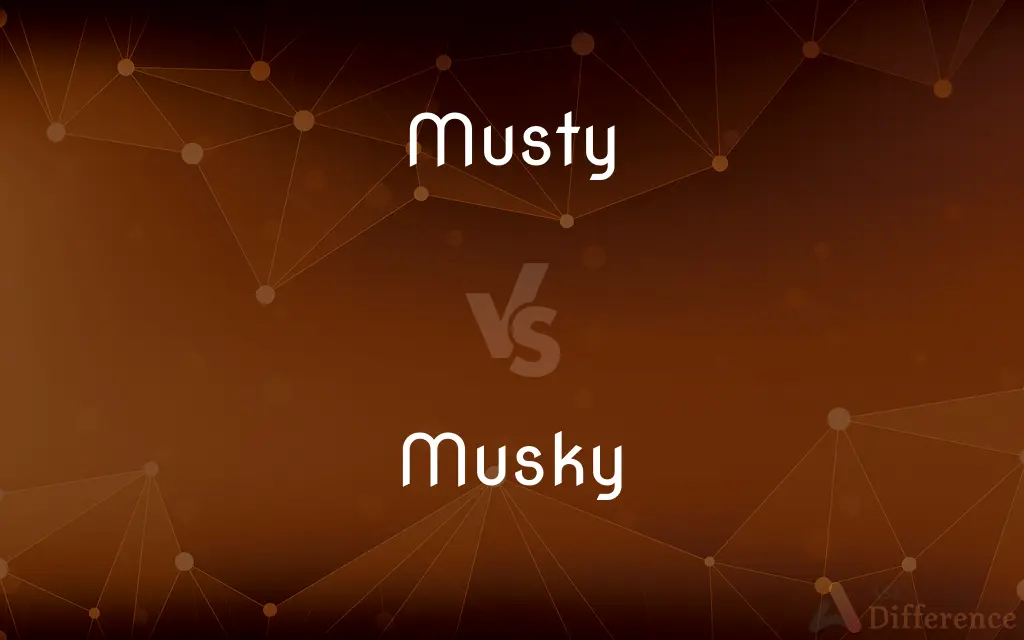Musty vs. Musky — What's the Difference?
By Fiza Rafique & Maham Liaqat — Updated on March 6, 2024
Musty is often associated with stale or moldy odors, while musky refers to a strong, often pleasant and earthy scent.

Difference Between Musty and Musky
Table of Contents
ADVERTISEMENT
Key Differences
Musty odors are typically associated with environments lacking fresh air or containing damp, stale conditions. These odors are often found in old houses, books, or clothing that hasn't been aired out for a long time. On the other hand, musky scents are complex and can be found in perfumery and nature, often described as warm, earthy, and animalistic. They are sometimes associated with cleanliness or freshness in certain contexts, unlike the undesirable connotation of mustiness.
While mustiness is generally considered to be an unpleasant smell, indicating the presence of mold, mildew, or neglect, musky smells are appreciated in various perfumes and colognes for their depth and ability to add richness to a fragrance blend. Whereas mustiness repels, muskiness can attract, highlighting the contrasting perceptions tied to each odor.
Musty smells are often indicative of a problem, such as moisture intrusion or inadequate ventilation, requiring action to remove the source of the odor. Conversely, musky scents, especially those synthetically created for perfumes, are intentionally added to products to evoke a specific sensory experience or emotional response.
In terms of removal, musty odors usually require cleaning, dehumidifying, or increased ventilation to eliminate. Musky scents, particularly those natural or added in fragrances, are generally not considered something to remove but rather something to be enjoyed or applied with intention.
The preference for musty versus musky scents is subjective and can vary widely among individuals. Some may find musty smells nostalgic or comforting, under certain circumstances, while others universally appreciate the complexity and sensuality that musky notes bring to a fragrance.
ADVERTISEMENT
Comparison Chart
Origin
Mold, mildew, lack of ventilation
Animals, plants, synthetic sources
Connotation
Negative, undesirable
Positive, luxurious, complex
Associated with
Neglect, damp environments
Perfumery, attraction
Removal
Requires cleaning, dehumidifying
Often not desired to be removed
Perception
Generally unpleasant
Can be alluring and pleasant
Compare with Definitions
Musty
Having a stale, moldy, or damp smell.
The attic had a musty odor, untouched for years.
Musky
Having a strong, earthy, and sometimes animalistic scent.
The perfume had a rich, musky base that lingered for hours.
Musty
Suggestive of something outdated or old-fashioned.
The library's musty books had a charm of their own.
Musky
Describing a fragrance that is warm and appealing.
He preferred musky scents for their depth and masculinity.
Musty
Lacking freshness or vitality.
The conversation felt musty, rehashing long-resolved debates.
Musky
Pertaining to or resembling musk.
The musky aroma of the forest after rain was invigorating.
Musty
Describing an environment that feels damp and unventilated.
The basement’s musty air needed clearing.
Musky
Used to describe certain animals' natural scents.
The musky scent of the deer warned the predator of its presence.
Musty
Indicative of neglect or lack of use.
The musty smell of the cabin indicated it hadn't been visited in ages.
Musky
Related to the sensual or attractive quality of a scent.
The candle's musky fragrance filled the room with a cozy ambiance.
Musty
Stale or moldy in odor or taste.
Musky
Of, relating to, or having the odor of musk.
Musty
Hackneyed or trite; dull.
Musky
Variant of muskie.
Musty
Out of date; antiquated.
Musky
The muskellunge.
Musty
Out of use or practice; rusty.
Musky
Resembling or characteristic of musk, especially in scent.
Musty
Affected by dampness or mould; damp, mildewed, mouldy.
Musky
Muskellunge
Musty
Having an odour or taste of mould; also (generally), having a stale or unfresh odour or taste.
Musty food
Musty furniture
A musty odour
Musky
Having an odor of musk, or somewhat the like.
Musty
Characteristic of or relating to mould or mouldiness.
Musky
The muskellunge.
Musty
(figuratively)
Musky
Resembling the smell of musk
Musty
Of attitudes, ideas, writing, or other abstract things: no longer fresh or interesting; outdated, stale.
Musty
Of a person: boring and unadventurous; also, old-fashioned, stuck in the past.
Musty
Bad-tempered, grumpy, irritable.
Musty
(rare) Of a male animal such as a camel or an elephant: in musth.
Musty
(obsolete) A type of snuff with a musty flavour (adjective sense 2).
Musty
To turn musty (adjective sense 1 or 2); to must.
Musty
Having the rank, pungent, offensive odor and taste which substances of organic origin acquire during warm, moist weather; foul or sour and fetid; moldy; as, musty corn; musty books.
Musty
Spoiled by age; rank; stale.
The proverb is somewhat musty.
Musty
Dull; heavy; spiritless.
Musty
Covered with or smelling of mold;
Moldy bread
A moldy (or musty) odor
Musty
Stale and unclean smelling
Common Curiosities
How can I get rid of a musty smell?
Eliminating musty smells involves cleaning the affected area, improving ventilation, and using dehumidifiers.
Can a musty smell be harmful?
Yes, musty smells can indicate the presence of mold or mildew, which may cause health issues for some individuals.
Is musky smell good or bad?
Musky smells are often considered good, especially in the context of perfumes and colognes, for their warm and earthy qualities.
What is musk used for?
Musk is used in perfumery to add depth, warmth, and a sensual quality to fragrances.
Are there any benefits to musky scents?
Musky scents are appreciated in aromatherapy and perfumery for their ability to evoke warmth, sensuality, and complexity.
What causes a musty smell?
A musty smell is caused by mold, mildew, or lack of ventilation in damp environments.
Are musty and musky smells similar?
While both are strong and distinctive, musty smells are generally unpleasant, associated with mold and neglect, whereas musky smells are considered pleasant and luxurious.
Why do some people like musty smells?
Some individuals may find musty smells nostalgic or comforting, despite their generally negative connotation.
Can musty smells indicate a serious problem?
Yes, persistent musty smells can indicate serious moisture problems or mold growth that may require professional remediation.
What distinguishes musty from other types of bad odors?
Musty odors specifically denote the presence of mold, mildew, or dampness, unlike other bad smells that can have various origins.
Are there health risks associated with musky scents?
Synthetic musky scents are generally safe, but some individuals may experience allergies or sensitivities to strong fragrances.
Can musky scents be found in nature?
Yes, musky scents can naturally occur in certain plants and animals.
Is musk only obtained from animals?
Historically, musk was obtained from animals, but today, synthetic musk is commonly used in fragrances.
How can I introduce a musky scent into my home?
Using musk-scented candles, incense, or diffusing oils can introduce a musky scent into your home.
Can musty and musky scents coexist?
While uncommon, a space can have both musty and musky scents, especially if it contains old wooden furniture or leather treated with musk oils.
Share Your Discovery

Previous Comparison
Micturate vs. Urinate
Next Comparison
Outlet vs. ReceptacleAuthor Spotlight
Written by
Fiza RafiqueFiza Rafique is a skilled content writer at AskDifference.com, where she meticulously refines and enhances written pieces. Drawing from her vast editorial expertise, Fiza ensures clarity, accuracy, and precision in every article. Passionate about language, she continually seeks to elevate the quality of content for readers worldwide.
Co-written by
Maham Liaqat













































